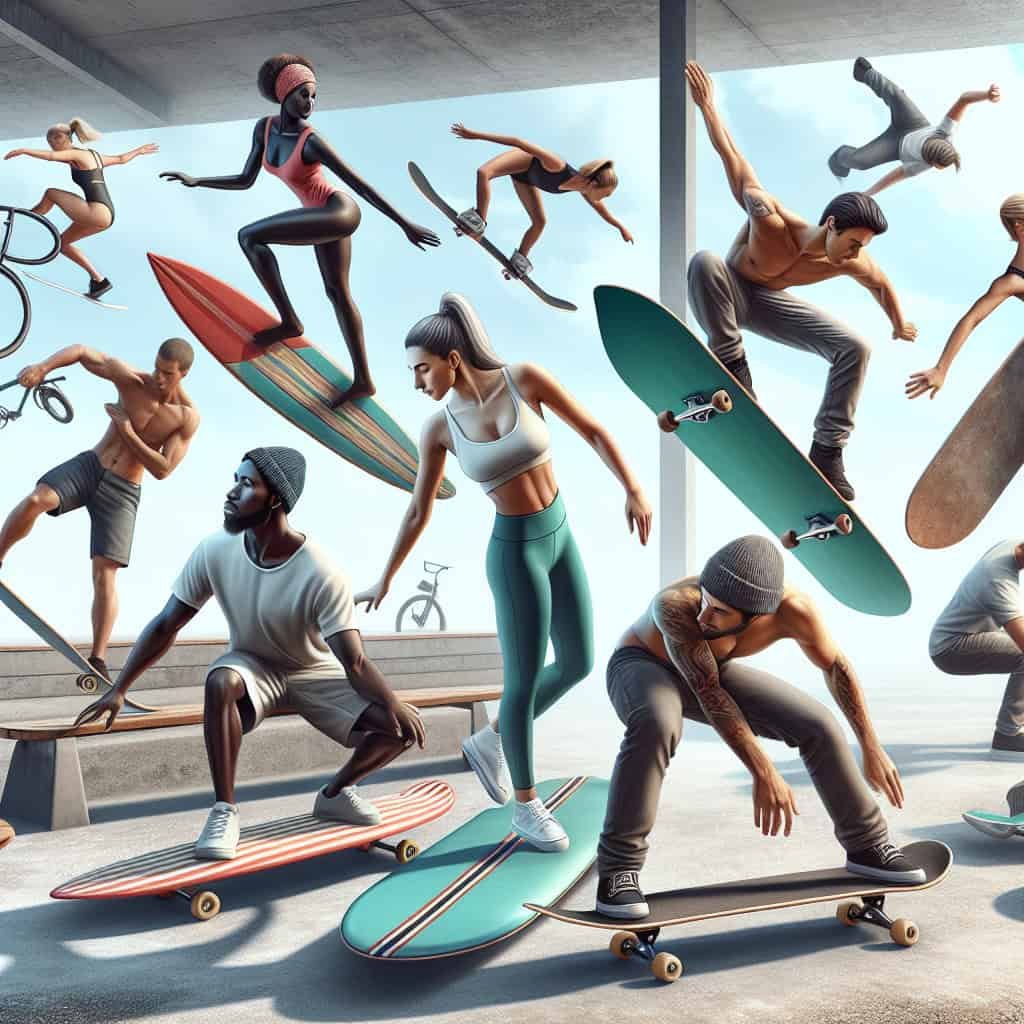If you’re an avid skateboarder looking to take your skills to new heights, cross-training with other sports might just be the missing piece to your puzzle. By exploring different athletic disciplines, such as surfing, snowboarding, or even gymnastics, you can enhance your skateboarding abilities in ways you never thought possible. Whether it’s improving your balance, building overall strength and agility, or expanding your creativity and trick repertoire, the benefits of cross-training are boundless. So, lace up your sneakers, grab your board, and get ready to embark on a thrilling journey of skill development and personal growth.

Improved Balance and Coordination
Enhanced body awareness
Cross-training with other sports can greatly enhance your body awareness. Different sports require different movements and techniques, which in turn improve your proprioception and ability to control your body in space. This increased body awareness can directly translate to improved balance and coordination on your skateboard. By engaging in activities such as yoga, martial arts, or gymnastics, you can develop a stronger sense of body control, allowing you to execute tricks and maneuvers with greater precision and ease.
Improved agility and reflexes
Cross-training with other sports can also enhance your agility and reflexes. Many sports involve quick movements, changes in direction, and rapid reactions, which can all contribute to improving your overall athleticism. By engaging in activities such as basketball, soccer, or tennis, you can enhance your ability to quickly adapt to different situations and react swiftly, ultimately improving your skateboarding skills. The improved agility and reflexes gained from cross-training can help you navigate obstacles, perform tricks, and maintain better control while riding your skateboard.
Ability to adapt to different surfaces
Skateboarding often takes place on various surfaces, including pavement, ramps, and rails. Cross-training with other sports can help you adapt to different terrains and surfaces more effectively. By engaging in activities such as trail running, mountain biking, or snowboarding, you can develop the ability to adjust your body position, weight distribution, and balance to accommodate the specific demands of different surfaces. This adaptability is crucial for skateboarders, as it allows you to confidently tackle any environment, increasing your versatility and expanding your skateboarding skills.
Increased Strength and Endurance
Building muscle strength
Cross-training with other sports can significantly contribute to building your muscle strength. Different sports require the use of various muscle groups, and engaging in activities that target these muscles can improve your overall strength. For example, activities like weightlifting, rock climbing, or swimming can help you develop stronger upper body muscles, which are essential for executing powerful skateboarding tricks and maintaining stability while riding. By incorporating cross-training exercises that target specific muscle groups, you can enhance your overall strength and subsequently improve your skateboarding performance.
Enhanced cardiovascular fitness
Engaging in cross-training activities also improves your cardiovascular fitness. While skateboarding itself is physically demanding, incorporating exercises that elevate your heart rate and challenge your cardiovascular system can further enhance your endurance and overall fitness level. Sports like running, cycling, or swimming are excellent for improving cardiovascular fitness and can directly translate to improved stamina and endurance on your skateboard. By strengthening your heart and lungs through cross-training, you’ll be able to ride for longer periods and push yourself to new limits.
Improved stamina and endurance
Cross-training activities not only boost your cardiovascular fitness but also improve your stamina and endurance. By engaging in sports that require sustained effort, such as distance running, cycling, or soccer, you can gradually increase your endurance capacity. This increased stamina allows you to ride for longer distances, perform tricks repetitively without fatigue, and push through challenging skateboarding sessions. Building your stamina and endurance through cross-training will help you become a more resilient and persistent skateboarder, enabling you to achieve new heights in your skating abilities.
Enhanced Flexibility and Range of Motion
Improved flexibility and mobility
Cross-training with sports that focus on flexibility and mobility can significantly improve your overall range of motion. Activities like yoga, Pilates, or dance can help you increase your flexibility, making your movements on the skateboard more fluid and effortless. Improved flexibility allows for a greater range of motion in your joints, preventing a feeling of stiffness and reducing the risk of injuries while skateboarding. By incorporating cross-training exercises that prioritize stretching and mobility, you can enhance your overall flexibility, making your skateboarding experience more enjoyable and injury-free.
Increased joint range of motion
In addition to improving overall flexibility, cross-training with other sports can increase your joint range of motion. Activities such as swimming, martial arts, or gymnastics often require movements that involve a wide range of joint motion. By practicing these activities, you can gradually increase the flexibility and mobility of your joints, allowing for smoother and more controlled movements on your skateboard. Having a greater range of motion in your joints enables you to execute tricks with more precision and reduces the risk of getting injured due to restricted movement.
Reduced risk of injuries
Cross-training with sports that improve flexibility and joint range of motion can help reduce the risk of injuries while skateboarding. When muscles and joints are more flexible, they can better absorb impact and handle sudden movements, reducing the likelihood of strains, sprains, or other injuries. By incorporating activities like stretching, yoga, or martial arts into your routine, you can promote better body alignment, balance, and stability, protecting yourself from unnecessary injuries and allowing you to enjoy skateboarding safely for years to come.
Diversified Skill Set
Development of complementary skills
Cross-training with other sports allows you to develop complementary skills that can enhance your skateboarding abilities. Each sport requires different techniques, body movements, and levels of coordination, which contribute to improving your overall athleticism. For example, practicing basketball can enhance your hand-eye coordination, while practicing gymnastics can improve your balance and body control. By diversifying your skill set through cross-training, you can bring newfound techniques and abilities to your skateboarding repertoire, allowing you to perform different tricks and maneuvers with greater ease and creativity.
Improved overall athleticism
Engaging in cross-training activities can significantly improve your overall athleticism. By participating in various sports, you challenge your body in different ways, pushing it to adapt and improve in multiple areas. This leads to enhanced strength, agility, coordination, and endurance, all of which are important components of athleticism. By developing a well-rounded athleticism through cross-training, you’ll become a more versatile and skilled skateboarder, able to handle a wide range of challenges and excel in various aspects of the sport.
Ability to perform different tricks and maneuvers
Cross-training with other sports can expand your repertoire of tricks and maneuvers on your skateboard. By practicing activities like parkour, martial arts, or breakdancing, you can learn new movements, flips, and spins that can be incorporated into your skateboarding style. Exploring these different sports not only adds excitement and variety to your skateboarding practice but also provides you with a fresh perspective and inspiration for creating new tricks. The ability to perform different tricks and maneuvers allows you to showcase your creativity and expressiveness, enhancing your overall skateboarding experience.

Injury Prevention
Strengthening of supporting muscles
Cross-training with other sports helps strengthen the supporting muscles that are often neglected in skateboarding. While skateboarding primarily targets the lower body muscles, engaging in activities like weightlifting, Pilates, or martial arts can strengthen your core, back, and upper body muscles. Strengthening these supporting muscles is crucial for maintaining proper posture, balance, and stability while riding your skateboard. By incorporating cross-training exercises that target these muscles, you can reduce the risk of imbalances, prevent overuse injuries, and improve your overall skateboarding performance.
Reduced risk of overuse injuries
Overuse injuries can be a common occurrence in skateboarding due to repetitive motions and high-impact landings. Cross-training with other sports can help reduce the risk of these injuries by allowing you to vary your physical demands and load on different muscle groups and joints. By alternating between activities such as swimming, yoga, or rock climbing, you give your body a chance to recover from the specific stresses of skateboarding while still maintaining your overall fitness. This reduces the likelihood of overuse injuries and keeps you on your skateboard for longer, enjoying the sport without unnecessary setbacks.
Balanced muscle development
Skateboarding predominantly targets particular muscle groups, which can lead to imbalances if not addressed. Cross-training with other sports helps promote balanced muscle development throughout your entire body. Engaging in activities like cycling, rowing, or Pilates can strengthen muscles that are less utilized in skateboarding, creating a more harmonious muscular balance. Balanced muscle development not only improves your overall performance but also reduces the risk of injuries, as your muscles work together more efficiently and effectively. By incorporating cross-training exercises that target different muscle groups, you can enhance your skateboarding abilities while promoting overall muscle balance.
Mental Benefits
Improved focus and concentration
Cross-training with other sports can improve your focus and concentration, benefiting your skateboarding skills. Many sports require a high level of concentration and mental focus to perform well. By engaging in activities such as archery, meditation, or rock climbing, you can develop mental discipline and learn to concentrate on the task at hand. This enhanced focus can help you stay present in the moment while riding your skateboard, allowing you to react quickly to changes in terrain or execute tricks with precision. Improved focus and concentration translate to better decision-making and ultimately improved performance on your skateboard.
Reduced stress and anxiety
Cross-training with other sports can provide an outlet for reducing stress and anxiety. Physical activity releases endorphins, which promote feelings of well-being and reduce stress levels. By participating in activities like hiking, yoga, or swimming, you can engage in a mindful exercise that allows you to relax, let go of negative thoughts, and rejuvenate your mind. This reduction in stress and anxiety can have a direct impact on your skateboarding skills, as a calmer mind is better able to focus, react, and perform under pressure. By incorporating cross-training activities that promote mental well-being, you can create a positive mindset and enjoy skateboarding even more.
Enhanced mental resilience
Engaging in cross-training activities can enhance your mental resilience, which is invaluable in skateboarding. Many sports require perseverance, determination, and the ability to bounce back from setbacks. By participating in activities such as martial arts, trail running, or gymnastics, you develop mental toughness and learn to overcome challenges. This mental resilience can be directly applied to skateboarding, where falls, failures, and obstacles are an inherent part of the learning process. By developing mental resilience through cross-training, you’ll be better equipped to face and overcome the mental hurdles that accompany skateboarding, allowing you to progress and excel in the sport.

Social Interaction and Community
Opportunity to interact with other athletes
Cross-training with other sports provides the opportunity to interact with athletes from different disciplines. Engaging in activities like team sports, group fitness classes, or outdoor adventures allows you to meet and socialize with individuals who share a passion for physical activity. This interaction can be inspiring, motivating, and even lead to new friendships. Connecting with other athletes can also provide you with valuable insights, advice, and support, fostering a sense of camaraderie and community outside of skateboarding. By actively participating in cross-training activities, you open yourself up to a broader network of like-minded individuals who can enrich your skateboarding journey.
Building a sense of community
Cross-training with other sports can help build a sense of community beyond the skateboarding world. Engaging in activities such as group runs, fitness boot camps, or yoga classes allows you to become part of a larger fitness community. Being surrounded by individuals with similar goals and interests creates a supportive and encouraging environment, where you can share your achievements, challenges, and experiences. This sense of community extends beyond the specific cross-training activities and can positively impact your skateboarding journey by providing a network of individuals who understand and appreciate your dedication and passion for physical activity.
Motivation and inspiration from peers
Interacting with other athletes through cross-training can be a great source of motivation and inspiration for your skateboarding skills. Seeing others push their limits, achieve their goals, and overcome obstacles can ignite your own drive to excel in skateboarding. Whether it’s witnessing impressive stunts during a parkour session or observing the dedication and commitment of fellow yoga practitioners, the energy and enthusiasm of others can fuel your own motivation to progress. By surrounding yourself with passionate and driven individuals, you’ll be constantly inspired to challenge yourself and reach new heights on your skateboard.
Recovery and Active Rest
Giving specific muscle groups a break
Cross-training with other sports allows you to give specific muscle groups a break while still engaging in physical activity. Skateboarding can be demanding on certain muscles, particularly the legs, ankles, and feet. By incorporating activities such as swimming, cycling, or yoga into your routine, you can allow these specific muscle groups to rest and recover while still maintaining your overall fitness level. Giving your muscles a break from the repetitive motions of skateboarding helps prevent overuse injuries, reduces muscle fatigue, and promotes faster recovery. By strategically including cross-training exercises that target different muscle groups, you can optimize your recovery and stay active during periods of rest.
Reducing the risk of burnout
Continuous and intense skateboarding practice can occasionally lead to mental and physical burnout. Cross-training with other sports provides a way to vary your physical activity and prevent burnout. Engaging in activities like hiking, surfing, or dance can refresh your mind and body, allowing you to take a break from the specific demands of skateboarding. The change in scenery, movements, and challenges can reignite your passion for skateboarding and prevent you from feeling stagnant. By incorporating cross-training activities as active rest periods, you can maintain your overall fitness, prevent burnout, and return to skateboarding with renewed energy and enthusiasm.
Maintaining overall fitness during recovery periods
Injuries are a part of any physically demanding activity, including skateboarding. During recovery periods, cross-training with other sports can help maintain your overall fitness level. Depending on the type and severity of the injury, engaging in activities like swimming, paddleboarding, or low-impact aerobic workouts can provide a way to stay active while avoiding activities that may aggravate the injury. Maintaining overall fitness during recovery helps prevent detraining and ensures a smoother transition back into skateboarding once healed. By consulting with a healthcare professional or physical therapist, you can incorporate cross-training exercises that are appropriate for your specific recovery needs and keep yourself in good physical condition.

Versatility in Different Environments
Adaptability to varied terrains
Cross-training with other sports enhances your adaptability to different terrains, allowing you to confidently navigate various skateboarding environments. Engaging in activities like trail running, rock climbing, or off-road biking exposes you to different surfaces, inclines, and obstacles. This exposure challenges your balance, coordination, and decision-making abilities, making you more adept at adapting to ever-changing skateboarding terrains. The adaptability gained through cross-training enables you to tackle different landscapes, from skate parks to city streets, with ease and confidence, enhancing your overall skateboarding experience.
Ability to transition between different sports smoothly
Cross-training with other sports improves your ability to transition between different sports smoothly. By engaging in activities such as parkour, surfing, or snowboarding, you develop a versatile physical skill set that transcends individual sports. The movements, techniques, and mental adaptability required in these activities can be directly applied to skateboarding. Learning how to smoothly transition between different sports not only adds excitement and variety to your training but also enhances your ability to quickly learn and master new skateboarding tricks, maneuvers, and styles. By cross-training across various sports, you become a well-rounded athlete who excels in multiple disciplines.
Improved performance in different conditions
Cross-training with other sports enhances your performance in different conditions. Skateboarding conditions can vary greatly, from wet surfaces to uneven terrain to extreme temperatures. By engaging in activities such as trail running, surfing, or skiing, you expose yourself to diverse conditions that challenge your adaptability and resilience. These experiences teach you how to adjust your technique, mindset, and physical effort to optimize your performance regardless of the external factors. The improved performance in different conditions gained through cross-training prepares you to maintain control, focus, and agility, ensuring that you can confidently handle any skateboarding situation or environment.
Fun and Variety
Enjoyment and excitement from trying new activities
Cross-training with other sports brings enjoyment and excitement to your skateboarding journey by allowing you to try new activities. Engaging in activities like skate-surfing, trampoline training, or acrobatics introduces novelty and adventure, injecting a fresh perspective into your training routine. The thrill of stepping outside your comfort zone and exploring new physical challenges can reignite your passion for sport, increase your overall motivation, and make your skateboarding practice more enjoyable. By incorporating cross-training activities that excite you and align with your interests, you’ll discover new dimensions of fun and excitement within your skateboarding journey.
Breaking the monotony of skateboarding practice
Skateboarding, like any activity, can sometimes become monotonous when practiced repeatedly without variation. Cross-training with other sports helps break the monotony by introducing new movements, techniques, and mental engagements. Escaping the routine and participating in activities such as parkour, yoga, or dancing provides a refreshing break from the demands of skateboarding. These activities challenge your body and mind in different ways, reigniting your passion and creativity for skateboarding. Breaking the monotony of skateboarding practice through cross-training keeps your training sessions fresh, engaging, and dynamic, ultimately enhancing your growth and skill development.
Discovering new passions and hobbies
Cross-training with other sports can lead you to discover new passions and hobbies that complement your skateboarding journey. Engaging in activities such as rock climbing, surfing, or martial arts can unveil hidden interests that resonate with you on a deeper level. These newfound passions can enrich your overall physical fitness and well-being, providing alternative outlets for self-expression, growth, and enjoyment. Discovering new hobbies and passions expands your horizons, allowing you to cultivate different aspects of your identity and bring newfound perspectives to your skateboarding practice. By actively exploring cross-training activities, you open yourself up to exciting possibilities and a more fulfilling lifestyle.

